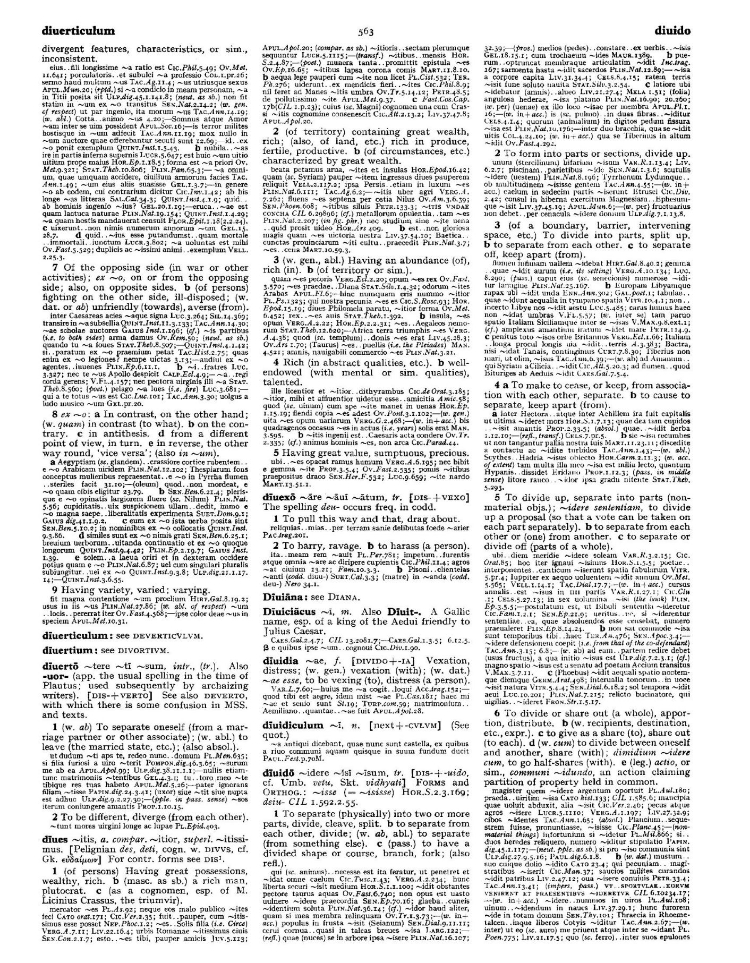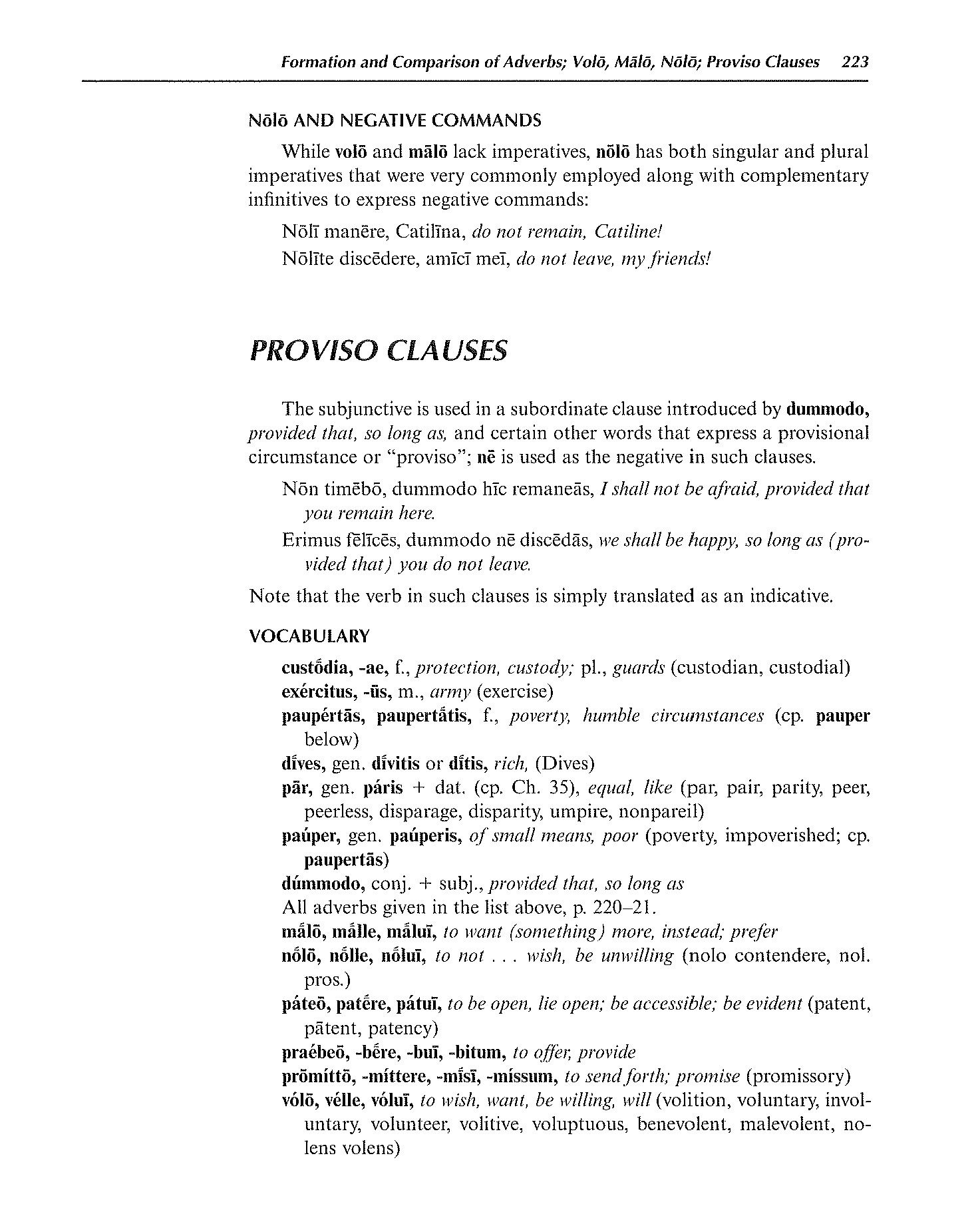
page_listing.tpl
page_subListingDetails.tpl
sub_listingDetails_style1.tpl
sub_listingDetails.title.tpl
dīves rich
dīves is a Latin Adjective that primarily means rich.
Definitions for dīves
Wheelock's Latin
Adjective
- 1
rich
English derivatives:
Dives
Oxford Latin Dictionary
Adjective
- 1
(of persons) Having great possessions, wealthy, rich. (b) (masc. as sb.) a rich man, plutocrat. (c0) (as a cognomen, esp. of M. Licinius Crassus, the triumvir).
- 2
(of territory) containing great wealth, rich; (also, of land, etc.) rich in produce, fertile, productive. (b) (of circumstances, etc.) characterized by great wealth.
- 3
(w. gen., abl.) Having an abundance (of), rich (in). (b) (of territory or sim.).
Sentences with dīves
Latin to English
Plūrimī autem virī dīvitēs multum metūs sentiunt.Compare However, very many rich men experience much fear.
Velle ac nolle ambobus idem societaque toto mens aevo ac parvis dives concordia rebus. Occubuere simul; votisque ex omnibus unum id Fortuna dedit, iunctam inter proelia mortem.Compare In liking and disliking they never differed; it was a lifelong marriage of two minds; and brotherly love made them rich in poverty. In death they were not divided, and of all their prayers Fortune granted them one only - to die in battle side by side.
Promittas facito: quid enim promittere laedit? Pollicitis dives quilibet esse potest.Compare See that you promise: what harm is there in promises? In promises anyone can be rich.
Nobilis idem ac dives sum; forma visque corpus excello.Compare He was both noble and rich; and excelled in personal beauty and strength.
Declension table for dīves
Cactus2000
| Singular | Plural | |
| Nom. | dīves | dīvitēs |
| Gen. | dīvitis | dīvitum |
| Dat. | dīvitī | dīvitibus |
| Acc. | dīvitem | dīvitēs |
| Abl. | dīvite | dīvitibus |
Data sources
Notes
- Definitions
- Frederick M. Wheelock, Wheelock's Latin, 6th ed., rev. Richard A. LaFleur (New York, NY: HarperCollins Publishers, 2005): 223.
- P. G. W. Glare, Oxford Latin Dictionary, Vols. 1-8 (Oxford: Clarendon Press, 1982): 563.
- Word frequencies
- Christopher Francese, "Latin Core Vocabulary," Dickinson College Commentaries, last modified 2014, http://dcc.dickinson.edu.
- Paul B. Diederich, The Frequency of Latin Words and Their Endings, PhD diss., (Columbia University, 1939).
- Louis Delatte, Suzanne Govaerts, Joseph Denooz, and Etienne Evrard, Dictionnaire fréquentiel et index inverse de la langue latine [Frequency Dictionary and Inverse Index of the Latin Language] (Liège, Belgium: Laboratoire d'analyse statistique des langues anciennes de l'Université de Liège [L.A.S.L.A.], 1981): 124.
Bibliography
Allen, Joseph H. Allen and Greenough's New Latin Grammar for Schools and Colleges: Founded on Comparative Grammar. Edited by James B. Greenough, George L. Kittredge, Albert A. Howard, and Benjamin L. D'Ooge. Boston, MA: Ginn & Company, 1903.
Crystal, David. A Dictionary of Linguistics and Phonetics. 6th ed. Oxford, UK: Blackwell Publishing, 2008.
Delatte, Louis, Suzanne Govaerts, Joseph Denooz, and Etienne Evrard. Dictionnaire fréquentiel et index inverse de la langue latine [Frequency Dictionary and Inverse Index of the Latin Language]. Liège, Belgium: Laboratoire d'analyse statistique des langues anciennes de l'Université de Liège (L.A.S.L.A.), 1981.
Diederich, Paul B. The Frequency of Latin Words and Their Endings. PhD diss., Columbia University, 1939.
Francese, Christopher. "Latin Core Vocabulary." Dickinson College Commentaries. Last modified 2014. http://dcc.dickinson.edu/latin-vocabulary-list.
Gildersleeve, Basil L., and Gonzales Lodge. Gildersleeve's Latin Grammar: Third Edition, Revised, and Enlarged. 3rd ed. London, England: Macmillan and Co., 1903.
Glare, Peter G.W. Oxford Latin Dictionary. Vols. 1-8. Oxford, England: Clarendon Press, 1982.
Krüger, Bernd. "Latin Conjugation Tables." Cactus2000. Accessed May 5, 2023. https://latin.cactus2000.de/index.en.php.
Pierson, Nick. "Sound of Text." Accessed October 26, 2019. https://soundoftext.com.
Wheelock, Frederick M. Wheelock's Latin. 6th ed. Revised by Richard A. LaFleur. New York, NY: HarperCollins Publishers, 2005.
Wiktionary Contributors. "Victionarium." Wikimedia Foundation, Inc. Updated March 18, 2019. https://la.wiktionary.org/wiki/Victionarium:Pagina_prima.
Citation
Chicago (17th ed.)
Allo Contributors. "dīves, dīvitis, ditis (adj.) - Latin Word Definition." Allo Latin Dictionary. Last modified . Accessed February 19, 2026. http://ancientlanguages.org/latin/dictionary/dives-divitis.
Entry created on . Last updated on .







